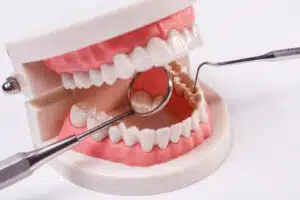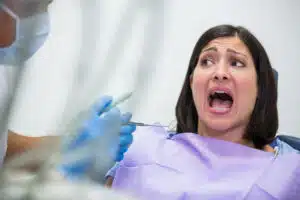Wisdom teeth are expected to erupt by the time most people reach their late teens or early twenties. They are our third molars, and for some people, wisdom teeth removal is necessary. This happens when wisdom teeth become impacted, meaning they are unable to fully erupt and can cause complications.
When is wisdom teeth removal necessary, and what are the complications that may come with the incorrect eruption of a person’s wisdom tooth? It’s important to understand the potential problems wisdom teeth can cause so you can make an informed decision about treatment of tooth extractions in Westchester.
5 Possible Complications Caused by Impacted Wisdom Teeth
#1 – Infection
If wisdom teeth become impacted, they can be more prone to infection due to the difficulty of cleaning around them. When an infection has started, it can lead to a wisdom tooth abscess, which is a pocket of infection that can cause pain and swelling. Infections also cause earaches, headaches, and bad breath.
You can tell if wisdom teeth are infected if there is a foul smell coming from the mouth and swollen glands near the wisdom teeth. If the symptoms start to appear, make sure to consult your dentist and know if wisdom teeth removal may be recommended.
#2 – Tooth Decay
It is difficult to clean wisdom teeth, which puts them at risk for tooth decay and cavities. Decay can spread from other teeth to wisdom teeth and vice versa, leading to even more complications and possible wisdom teeth removal.
That is why it is important to maintain good oral hygiene practices and visit your dentist regularly to monitor wisdom tooth eruption or impaction.
#3 – Mouth Ulcers
Mouth ulcers can form around wisdom teeth due to food getting trapped in the crevices, causing infection and discomfort. Additionally, if your wisdom tooth has grown in the wrong direction, it can rub against the cheek and lead to mouth ulcers.
While you can treat mouth ulcers with topical medications, they are painful and may continue to appear. If wisdom teeth cause ulcers, removal may be necessary to prevent them from getting worse and causing more pain.
#4 – Teeth Crowding or Incorrect Bite
When wisdom teeth become impacted, they can push the other teeth out of place, resulting in teeth crowding. This can lead to a misaligned bite, leading to further complications. Incorrect bites will cause jaw pain, headaches, and even difficulty speaking or eating. If wisdom teeth are the cause of teeth crowding and misaligned bite, removal can help to improve the condition.
#5 – Cysts
One of the most severe complications of an impacted wisdom tooth is the formation of a cyst. A cyst is a sac of fluid that can form within the jawbone where the wisdom tooth grows. If left untreated, cysts can cause damage to the jawbone and potentially spread infection throughout the body. It can also create a tumor that (while usually benign) can lead to the erosion of tissue or bone from the jaw.
Cases of cysts are rare, but wisdom teeth removal may be necessary to prevent the cyst from growing in size. Symptoms of wisdom tooth-related cysts include pain and swelling; it is critical to see a dentist if these appear.
When Is It Time to Get Your Wisdom Tooth Removed?
If wisdom teeth are causing any of the complications mentioned above, wisdom teeth removal may be necessary to prevent further damage. Below are the following symptoms you may look out for:
- Pain in the wisdom tooth area
- Swelling around wisdom teeth
- Difficulty opening the mouth due to wisdom teeth pushing other teeth out of place
- Bad breath and/or foul taste in the back of the mouth
- Signs of infection such as redness around the wisdom tooth area, fever, and swollen lymph nodes near the jawline
Wisdom Teeth Removal Process
Removing a wisdom tooth can seem scary, but the right oral surgeon can make the process relatively painless. The wisdom teeth removal procedure begins with sedation or anesthesia. Depending on how severely the wisdom teeth are impacted, the dentist may recommend numbing the area with a local anesthetic or using general anesthesia.
Once the anesthesia has been administered, the wisdom teeth will be removed, gums sutured and your oral surgeon may also prescribe antibiotics if deemed necessary.
Following wisdom teeth removal, your mouth may feel tender and swollen for a few days. You will be given instructions on how to care for your teeth properly during this time. It is important to follow these instructions closely and return to the surgeon if any symptoms persist or worsen.
Consult Dr. Andrew Greenberg for Wisdom Teeth Removal in Briarcliff Manor, NY
So, if you are looking for wisdom teeth removal in Briarcliff Manor, NY or its surrounding areas, don’t hesitate to contact Dr. Andrew Greenberg for a consultation today. He is committed to providing trusted dental health and oral surgery procedures in the area and will ensure that you get the best care possible.
If you think wisdom teeth removal is necessary, Dr. Andrew Greenberg can help you determine the best course of treatment. Dr. Greenberg is an oral and maxillofacial surgeon with many years of experience in wisdom teeth extraction and other procedures. He is also certified in general anesthesia in the practice of dentistry in the state of New York and is an advanced cardiovascular life support provider.
Dr. Greenberg can provide you with the right treatment, care, and safety to help manage wisdom teeth-related complications. If removal is necessary, he will make sure to deal with any complications beforehand to ensure that the wisdom teeth extraction process is as safe and successful as possible.
So, if you are looking for wisdom teeth removal in Briarcliff Manor, NY or its surrounding areas, don’t hesitate to contact Dr. Andrew Greenberg for a consultation today. He is committed to providing trusted dental health and oral surgery procedures in the area and will ensure that you get the best care possible.


